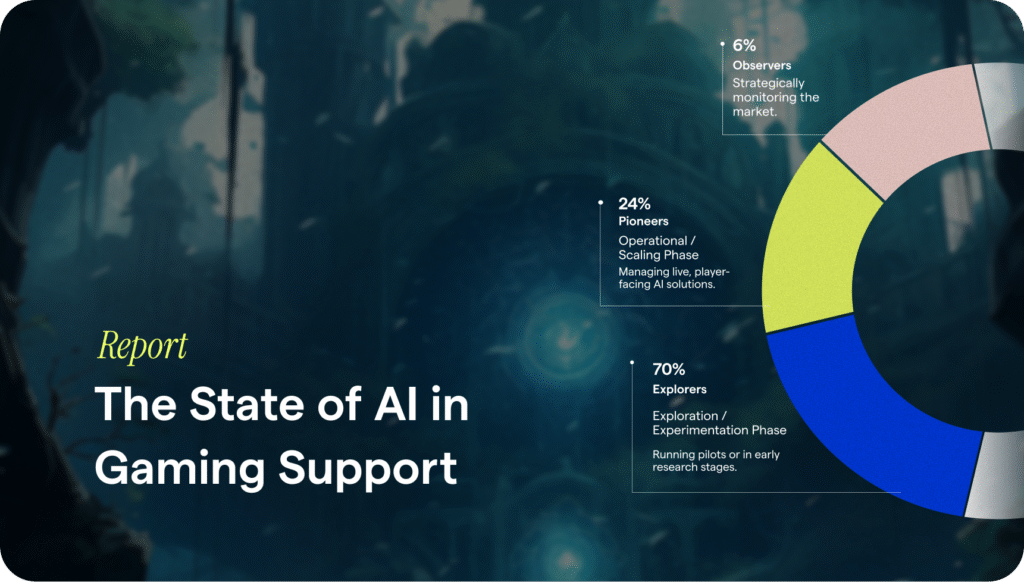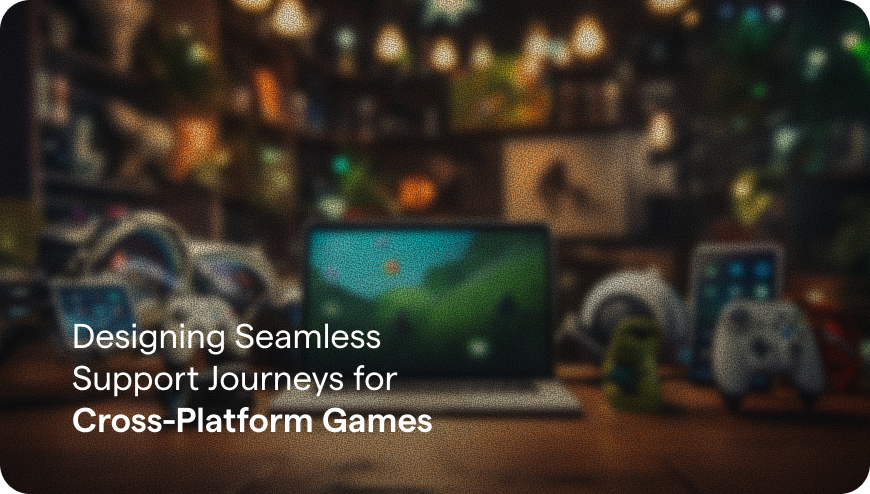Managing player support at scale is one of the biggest challenges in the gaming industry. As player bases grow and support requests multiply, the traditional methods of handling customer service start to crumble under the weight. Gaming companies are now faced with the task of addressing thousands of player concerns daily, from minor technical issues to more complex account inquiries. The rise in support requests isn’t just a matter of volume; it’s also a reflection of evolving player expectations for fast, effective, and personalized service.
In this article, we’ll explore how gaming studios can manage 10,000+ player support requests a day without the need to significantly expand their support teams. By leveraging AI, automation, and smart workflows, gaming companies can maintain high service standards while scaling their operations efficiently.
The High-Volume Player Support Challenge
Managing high-volume player support requests has become one of the most pressing challenges in the gaming industry. As games evolve and player bases expand, the demand for immediate and effective support grows exponentially. For gaming companies, keeping up with the volume of support tickets, while maintaining high service quality, can feel like an overwhelming task.
Why Support Requests Are Exploding in Gaming
The 2024 Digital Benchmark Report reveals that gaming companies now handle thousands of support requests daily, with peak demand times often tied to game updates, special in-game events, and seasonal promotions. These moments, while boosting player engagement, also create a massive influx of support queries. As games grow in complexity with new features, items, and in-game events, the support needs also become more multifaceted. The growth in mobile gaming and live-service titles has led to even more frequent player interactions, as players now expect to engage and resolve issues within the game environment itself, without leaving the app.
This shift in the gaming landscape brings with it a heightened expectation from players. With players investing more time and money, their demand for quick resolution of issues—such as missing items, account problems, or gameplay disruptions—has increased significantly.
Why Traditional Scaling Methods Fall Short
Traditionally, scaling customer support to meet this growing demand meant expanding headcount, but this solution presents several challenges. As noted in the Helpshift Buyers Guide, simply adding more agents to handle increasing queries often results in escalating operational costs, without necessarily improving efficiency. Training new agents to handle specialized queries or complex issues can be resource-intensive and costly, especially when the volume of routine, low-complexity queries continues to rise.
With a global player base, support teams are expected to address inquiries across multiple time zones, which further complicates staffing decisions. Without the right mix of automation and smart workflows, scaling support becomes unsustainable, leading to slower response times, higher costs, and ultimately, lower player satisfaction.
How to Manage 10,000+ Support Requests Without Growing Your Team
Scaling support operations without exponentially increasing headcount requires a strategic approach to automation, smart workflows, and AI-powered tools. By using the right technologies, gaming studios can manage thousands of support requests daily, ensuring that players get the timely assistance they expect, all while controlling operational costs. Let’s explore how game studios can handle massive player support volumes without the need to hire more agents.
Automate Tier-1 Issues with AI Chatbots
One of the most significant opportunities for gaming studios lies in automating the handling of low-complexity, high-frequency support issues. According to the Helpshift Buyers Guide, AI-powered chatbots can tackle a wide array of simple requests, including account logins, in-game currency issues, and frequently asked questions. By automating these common queries, game studios can free up human agents to focus on more complex issues that require personalized attention or higher-level troubleshooting.
The 2024 Digital Benchmark Report emphasizes the role of AI in automating player support workflows, with AI chatbots resolving up to 58% of all support requests across industries. In the gaming sector, this can significantly reduce the strain on support teams, enabling them to resolve issues faster while maintaining a high level of accuracy and service quality. Through continuous learning, AI chatbots can enhance their performance over time, providing players with a seamless support experience while reducing the number of repetitive tickets that require human intervention.
Enable In-App Support to Keep Players Engaged
Integrating customer support directly within the game or app is a proven way to reduce friction and enhance player satisfaction. The Helpshift Multilingual Support Guide highlights that in-app support allows players to seek help without ever leaving the game environment, which keeps them engaged and minimizes the chances of churn. By embedding support features such as live chat, FAQs, and issue tracking directly into the game interface, players can access assistance without disrupting their gaming experience.
This in-app support also facilitates immediate resolution, reducing the wait times often associated with email or web form submissions. For high-volume studios, this integration keeps the player experience fluid, ensuring that customer support is just a tap away when needed.
Use Smart Routing and Workflow Automation
As gaming companies scale their support teams, managing workflows becomes increasingly crucial. Helpshift’s Smart Routing and workflow automation tools can automatically triage and prioritize support requests based on factors like issue complexity, player history, or urgency.
Automation tools can also streamline the ticketing process, automatically assigning issues to agents or bots that are best equipped to handle them. For instance, technical issues might be routed to agents with specialized knowledge, while general inquiries could be handled by AI-powered chatbots. This approach reduces the response time for players and ensures that agents aren’t overwhelmed with tasks outside their expertise. In our study, we noted that 85% of companies are leveraging some form of automated workflows, indicating that this is becoming a standard practice in scaling support effectively across industries.
Break Language Barriers with Multilingual AI
In the global gaming market, offering multilingual support is a necessity, not a luxury. The Helpshift Multilingual Support Guide illustrates how language barriers can alienate players and reduce satisfaction. To truly scale global support operations, game studios must be able to provide assistance in multiple languages without relying on a massive, multilingual team. AI-driven solutions, such as Helpshift’s Language AI, enable companies to break language barriers efficiently.
By integrating multilingual AI into their support systems, gaming studios can offer real-time translation and support in over 70 languages. This allows players from different regions to engage with support in their native language, increasing their trust in the brand. This not only improves the overall support experience but also opens up new markets for global game studios.
Case Studies from High-Volume Gaming Studios
Leading gaming studios have successfully managed to scale their player support operations without significantly increasing headcount. By leveraging automation, AI, and in-app support solutions, these companies have enhanced efficiency, reduced operational costs, and improved player satisfaction.
Scopely: Scaling Support for Global Hits
Scopely, a mobile-first game developer and publisher, has implemented a robust support system to handle the vast number of player inquiries across its popular titles like Monopoly GO! and Stumble Guys. The company utilizes a comprehensive support platform that offers multilingual assistance, ensuring players worldwide receive timely help in their preferred language.
For instance, Monopoly GO! provides in-game customer support through a dedicated help center, allowing players to access FAQs, submit support tickets, and track their issues directly within the game interface. This integration minimizes friction and enhances the player experience by offering immediate assistance without leaving the app.
Scopely’s approach demonstrates how integrating in-game support can streamline operations and maintain high service levels, even with a large and diverse player base.
Wildlife Studios: Efficient Support at Scale
Wildlife Studios, one of the largest mobile gaming companies globally, has developed a player support system that efficiently manages a vast number of inquiries across its portfolio of over 60 games. The company emphasizes the importance of providing accessible and responsive support to its global audience.
Through its dedicated player support page, Wildlife Studios offers players easy access to help resources, including FAQs and contact options. This centralized support hub ensures that players can quickly find solutions to common issues or reach out for personalized assistance when needed.
By focusing on accessibility and responsiveness, Wildlife Studios effectively handles high support volumes without compromising on service quality.
Jam City: Transforming Support into a Business Driver

Jam City, known for titles like Cookie Jam and Harry Potter: Hogwarts Mystery, faced challenges in scaling its customer support to meet the demands of its growing player base. The company partnered with Helpshift to transition from email-only support to a more dynamic in-game messaging system.
This shift allowed Jam City to deflect 90% of support tickets through self-service options and messaging, reducing overall ticket volume by 30%. Consequently, customer satisfaction (CSAT) scores doubled, and the company gained valuable insights into player feedback through enhanced reporting tools.
Jam City’s experience highlights how integrating AI-driven support solutions can not only manage high support volumes but also transform customer service into a strategic asset that drives business growth.
Metrics That Prove You’re Scaling Efficiently
Measuring the efficiency of your support operations is essential to ensure that the systems and processes you have in place are achieving the desired outcomes. By tracking the right metrics, gaming companies can gain insight into the effectiveness of their support solutions, identify areas for improvement, and demonstrate that they are scaling efficiently. Let’s explore some key metrics that indicate successful scaling in high-volume support environments.
First Response Time (FRT)
The 2024 Digital Benchmark Report emphasizes that a quicker response time correlates with higher customer satisfaction (CSAT) and a greater likelihood of resolving the issue on the first contact. In high-volume environments, reducing FRT is crucial to maintaining a positive player experience and preventing frustration.
For gaming companies handling thousands of support tickets daily, automating the first response with AI-powered chatbots or smart workflows can drastically reduce FRT. Players can receive instant acknowledgment or basic information right away, with more complex issues routed to human agents for resolution. This efficiency can lead to faster resolutions and a more streamlined support process overall.
Deflection and Automation Rates
Deflection and automation rates provide valuable insights into how effectively your support systems are handling the volume of requests. Deflection occurs when customers can resolve their issues without needing to engage directly with a support agent, usually via self-service resources like knowledge bases or AI-powered chatbots.
Tracking the automation rate, which measures the percentage of support requests resolved through AI or automated systems, is crucial for understanding the scalability of your support operations. As seen with companies like Jam City, automation can deflect up to 90% of issues, allowing human agents to focus on more complex problems. The higher the automation and deflection rates, the more efficiently a gaming company can scale without expanding its support team.
CSAT and Agent Productivity
Customer Satisfaction (CSAT) is an essential metric that directly reflects the quality of your support. It measures how satisfied players are with the assistance they received, and it’s typically gathered through surveys after support interactions. A high CSAT score indicates that your support solutions are not only handling the volume but also delivering a positive player experience. The 2024 Digital Benchmark Report highlights that gaming companies leveraging automation and AI tools have seen significant increases in CSAT scores, as these technologies enable faster and more accurate resolutions.
Alongside CSAT, Agent Productivity is another key metric. It tracks how effectively support agents handle their workloads, measuring the number of tickets resolved per agent per day. Automation tools like smart routing and AI co-pilots, as used by Jam City and Scopely, can boost agent productivity by reducing the time spent on repetitive tasks, allowing agents to focus on complex cases. By optimizing agent workflows, companies can manage higher ticket volumes with the same or fewer agents, improving both efficiency and player satisfaction.
Final Thoughts
Scaling player support for high volumes of inquiries doesn’t have to mean expanding your team at an unsustainable rate. By embracing automation, AI, and smart workflows, gaming companies can efficiently handle thousands of support requests daily without compromising on player satisfaction.
As we’ve seen through the case studies of Scopely, Wildlife Studios, and Jam City, leveraging these technologies can not only reduce operational costs but also significantly enhance the support experience. Tools like AI chatbots for Tier-1 issues, in-app support integrations, and multilingual AI can help scale operations while keeping players engaged and satisfied.
The key to scaling efficiently lies in embracing automation and intelligent routing systems that reduce the strain on human agents and allow them to focus on more complex, high-value tasks. Moreover, by tracking the right metrics—such as First Response Time (FRT), Deflection and Automation Rates, and CSAT—companies can continuously optimize their processes and ensure that their scaling efforts are paying off.
As the gaming industry continues to grow, adopting these modern support solutions will become increasingly essential for staying competitive. By investing in AI-driven customer support tools today, gaming studios can build a robust and scalable support system that ensures players always feel valued—no matter how large the player base grows. Book a demo with Helpshift now!








